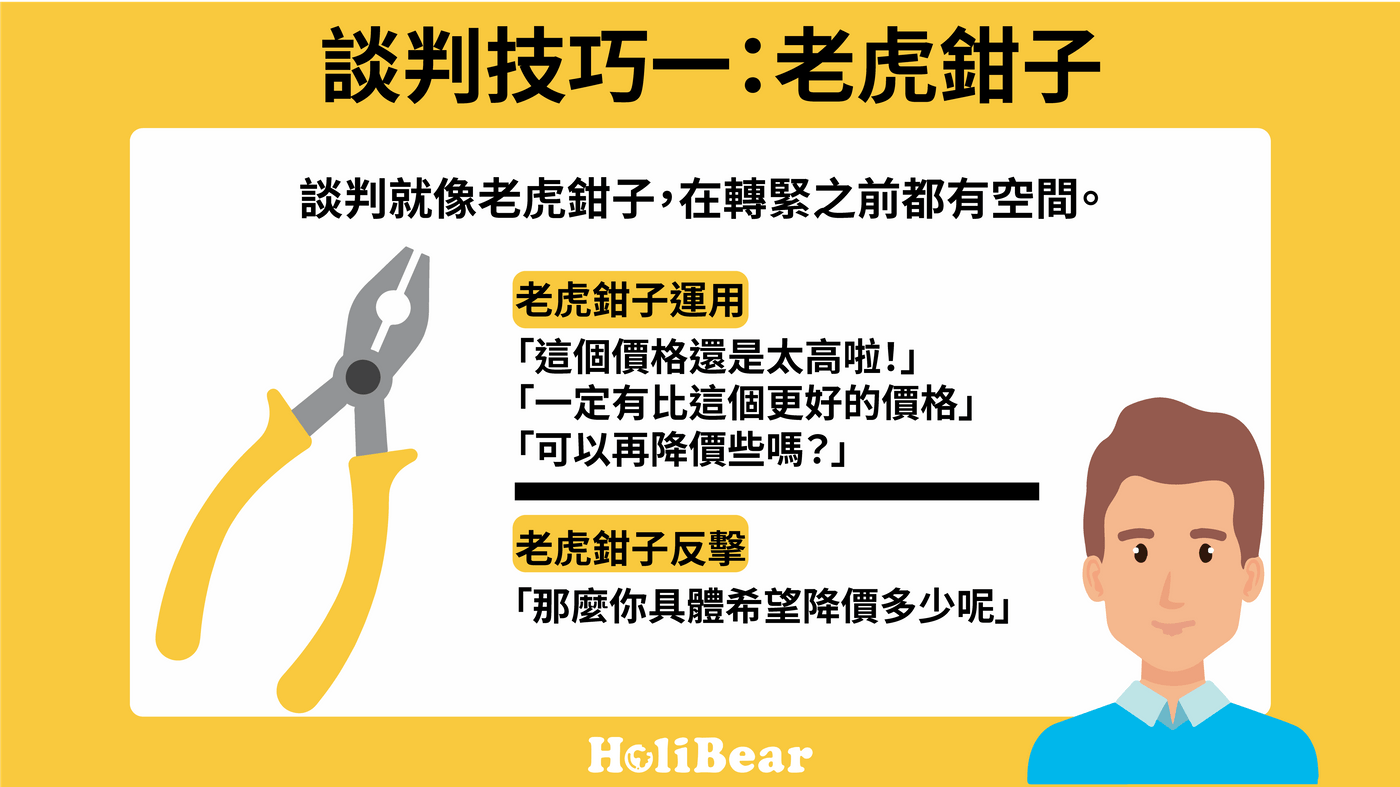
大家好,我是稀有的橘色熊熊 – 哈利熊,橘色的毛髮象徵我的熱情以及創造力!
Negotiation Skills Series|Negotiation Master Chris. Six of Clover's negotiating skills made public
Is negotiation an advanced communication skill only used by experts? In fact, negotiation is a skill that can be seen everywhere in life and can be applied at any time. American communication negotiator Chris. Clover summed up years of experience in negotiation and negotiation, and revealed six super practical negotiation tips!
Holibear - Negotiation Negotiation

Harry Bear's negotiation skills series, share with you how to become a negotiator step by step. Maybe you think that negotiation is an advanced skill that is not used, but it is actually an important communication skill that can be seen everywhere in life and used at any time. American communication negotiator Chris. Clover summed up his years of negotiating experience and revealed six super practical negotiation skills you may not know.
Negotiation skills 1. Vise

If you're buying something, a good negotiation technique is the "vise". When the other party makes an offer, you can say, "There must be a better price than this" or "It's still a bit high for me." Or "Can the price be lowered a little more?" Just like a vise, you can keep turning the pliers until the screw is tight, especially when the other party can easily and quickly drop the price, you can turn and turn again.
So what if the other party uses this trick?
You can reply: "So how much do you want to reduce the price?" The key here is "specific" . Let the other party give you a specific number. This is an opportunity for the other party to make a bid.
Negotiation skills 2. Products do not meet expectations

This is also a common negotiation technique used by buyers. See if your product doesn't meet expectations. For example, if you're buying a car, you can say, "This is not the color I would have liked." In the workplace, you can say, "We were looking for a local manufacturer" or "We were looking for smaller parts". Remember, it's best not to attack the seller's product directly, but to place it on a product that is not expected.
"I was going to say that it should be okay to watch it live...but to be honest, I think the color is a little too bright...I don't know..."
So what if the other party uses this trick?
The usual answer is, "It's in the price." Let's say you're selling an old, old car and the customer keeps complaining about scratches, broken chairs, etc. Instead of complaining about the customer, tell him this It is already one-tenth of the price of an ordinary car. It is precisely because this car has these problems that it is so cheap.
To know if customers really like your product, you can pay attention to the small details in many communication.
Are they touching the product all the time?
Is their body language happy?
You can even ask them directly, what do you think of the product other than what they say?
Negotiation Skill 3. Reluctant Buyers/Sellers

This is a commonly used negotiation technique. No matter how much you love the product, you have to show reluctance. This applies to buyers as well as sellers. If you are a buyer, you can say that you are not ready to buy this product or that your husband or wife will not be happy that you spent so much money. If you're a seller, you can say, "Oh no! That's my favorite collection! It's our treasure!"
Negotiation skill 4. Hide your true preferences

This negotiation technique is an advanced technique for the "reluctant buyer/seller" that hides your preferences. The rule is, if you really like a product, declare that you don't. If you don't like a product very much, declare that you like it. Why does this work?
Because if the other person knows you like a product, they will try to get you to buy it, and they may say, "This one in red is very popular, and I may not be able to help you get it!" They may let you Pay more to "keep" this product. The best way is to ask them what color they have and say, "I can do the red one too, it's not ideal, but if the price is reasonable I'm ok". Furthermore, don't say: "I will definitely want this product this week", but first ask the other party: "When can I get the product?" Maybe the other party can give it to you in two days, but if you It is revealed that you urgently need this product, and maybe the other party will ask you to "raise the price" in order to get it within time.
So ideally, in the negotiation, don't show all your needs too quickly, but leave it in the middle and later stages of the negotiation and try it "inadvertently".
Those things you claim you like but you don't really like can be a distraction on the one hand and a bargaining chip on the other. "Okay! If you give me a good enough price, I can consider giving up the XXX that I like very much."
Negotiation Skill 5. Salami Skills

This is a more complicated negotiation technique, but with adequate preparation, it can be a very effective negotiating technique. The reason why it is called "salami" is because it is a thin slice like real salami, and every time it only gets some benefits from the negotiating opponent, slowly and gradually, it accumulates little by little. Get up and get a lot of benefits before your opponent finds out.
Let's take a look at the example below.
"Hey! I think your class is good, but there are a few things that I think could be better. First, we want to add evening classes...plus 10 more students per class...oh right, everyone have a copy of your book."
"Okay, the evening classes are more difficult for me, but maybe I can extend my end time, and the class ends at six. No problem with multiple students. I'd be happy to provide books, but I'd like to be charged for books, $200 a copy."
"Okay, thank you for your willingness to let more students come to the class. For the extra class, we will need more than an hour, and we hope to increase the evening class and end at about nine o'clock. As for the increased cost of books, Andy, You charged us 30,000 yuan for training! It shouldn’t be difficult to provide a few books!”
"Okay! I can provide some free books. But the end of 9 o'clock is really uncooperative. It takes too much time than expected. I will need additional fees, maybe another ten thousand yuan."
"Charlie, you've come here every time. Ten thousand yuan is a bit too much. Is there a lower price...?"
Just like this, like eating salami, I ate a lot of slices before I knew it!
So what if the other party uses this trick?
The first, and best way, is one-for-one . For example, if you should promise to give fast delivery service, and the other party asks for more beautiful packaging, then you can say "if you want more beautiful packaging, the arrival time will be longer."
Second, it can be packaged in a whole new way . "We can do fast delivery and have nice packaging, but there will be a price increase." Or "If you want fast delivery and nice packaging, it will require you to order a lot. You have to order 100 at a time. Free beautifully packaged service.”
Third, if you find that the other party continues to use salami and gets a lot of value-added items that are beyond the cost or budget, you can say, "I need to ask my boss." Then come back and say, "I'm sorry, We may not be able to meet all your needs, or the deal needs to be cancelled. I can pack it, but it will take longer to ship, or you may need to add a fast delivery service.”
Negotiation skills 6. Time pressure

Time is also a bargaining chip, and a very important one. The ideal situation is that the deal has no time pressure on you. When the time pressure of the other party is greater than yours, you have a greater advantage in the negotiation, because you only need to wait until the other party runs out of time before agreeing your terms.
Generally speaking, there are three commonly used time pressures.
1. Meeting time pressure
How much time does the other party have to discuss? Are they catching a plane or a high-speed train? Is the other party tired? Are you impatient? Some people just want to quickly reach an agreement and leave, and you can see the clues from the other person's body language and other clues. And your attitude should be: I enjoyed this meeting very much, I would like to spend the whole day discussing it.
2. Negotiation time pressure
Is there a time point that must be set for this negotiation? Did the other side's boss require them to come to an agreement within a certain period of time? Are there any shipping time requirements? Is the lease about to expire? Will prices go up next month?
3. Time pressure of trading
Is there a time limit to this deal? This product was prepared by the other party for Christmas? Or for a specific upcoming event?
The above is the negotiation and communication master Chris. Clover's six secret negotiation skills, you can also use it in the next negotiation!
Like my work?
Don't forget to support or like, so I know you are with me..
Comment…